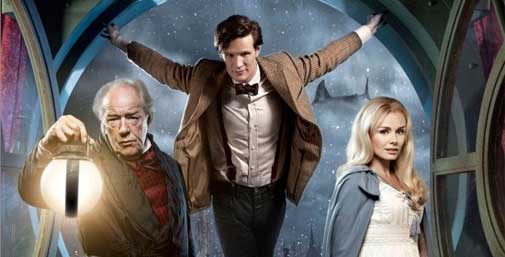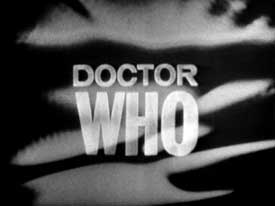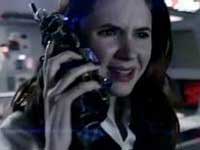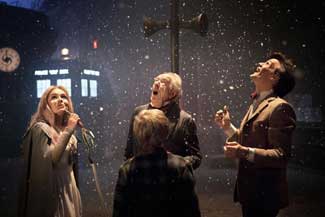
Here in the U.S., our Christmas TV traditions include seasonal reruns and movie marathons -- but in the U.K., there's a Christmas Day TV tradition that each year offers something new: a fresh Doctor Who holiday special, broadcast by BBC 1 as a family post-dinner treat. Thanks to BBC America, this year -- for the first time -- we in the colonies get the same treat, on the same evening...
We've come close, previously. Last year, we got the latest Doctor Who special the day after Christmas. But this year's special, Doctor Who: A Christmas Carol, is a same-day first. British viewers get to see it at 7 p.m. GMT (Greenwich Mean Time) on December 25, while American viewers get to see it the same night at 9 ET. And if you add this to your holiday TV traditions, you'll see why those in the United Kingdom love the house calls by their Doctor.

Doctor Who is a British sci-fi series that began in 1963, and hasn't stopped since. Its central character, the Doctor, is a time-traveling renegade Time Lord who travels the universe in a deceptively tiny police call box. From time to time, the Doctor regenerates, and changes appearances in a cellular metamorphosis. This allows the Doctor to be played by a succession of actors -- the current Doctor, Matt Smith, is the 11th -- each of whom puts his own stamp on the role.
The same goes for the show's executive producers: They pass the baton on occasion as well, and hand the reins to fresh, eager successors. At the moment, the head writer and executive producer of Doctor Who is Steven Moffat, who earlier this year displayed his cheeky, likable approach to familiar material by writing the superb trio of Sherlock telemovies, modernizing Sherlock Holmes without betraying his spirit.
Moffat has done the same with his incarnation of Doctor Who. Smith is 26, the youngest Doctor in the series' 47-year history. There's a playfulness to his interpretation of the role -- and in the Christmas special, he gets to play opposite two ends of the acting spectrum. One guest star is one of the greatest living actors, and the other is making her acting debut.
The talented veteran is Michael Gambon, known to a whole generation of moviegoers as Dumbledore in the Harry Potter films -- but to me, he'll forever be known and revered, primarily, for his starring role in 1986's The Singing Detective, the most brilliant and inventive drama ever written for television.

In Doctor Who: A Christmas Carol, Gambon plays Kazran Sardick, a very Scrooge-ish despot of an alien city that looks a bit like Dickensian London, but with a few differences: flying fish, for example, that actually fly, in the atmosphere high above the planet. And a spaceship -- a knowingly, humorously Enterprise-like craft -- closing in on the planet and about to be destroyed if it can't regain control of its flight systems.
The Doctor has only an hour to save the spaceship, whose passengers include his companion Amy Pond (Karen Gillan) and her brand-new husband Rory Williams (Arthur Darvill), on an ill-fated honeymoon voyage. The key to saving the ship involves enlisting the aid of bitter, unhelpful Kazran -- and the best way to do that, the Doctor decides, is to borrow a bit of time-travel inspiration and visitation from Charles Dickens.

Eventually, this path leads us to the other guest star, making her acting debut. Playing Abigail, a cryogenically suspended woman with an ethereal voice, is Welsh opera star Katherine Jenkins, who is as uncommonly gorgeous as her voice.
What a talent. What a debut. And yes, she sings -- in the Doctor Who universe, when they do A Christmas Carol, the emphasis is on the word Carol.
O come, all ye faithful viewers -- and enjoy the same Christmas-day feast as they're digesting today on the other side of the pond. It's jolly, good.